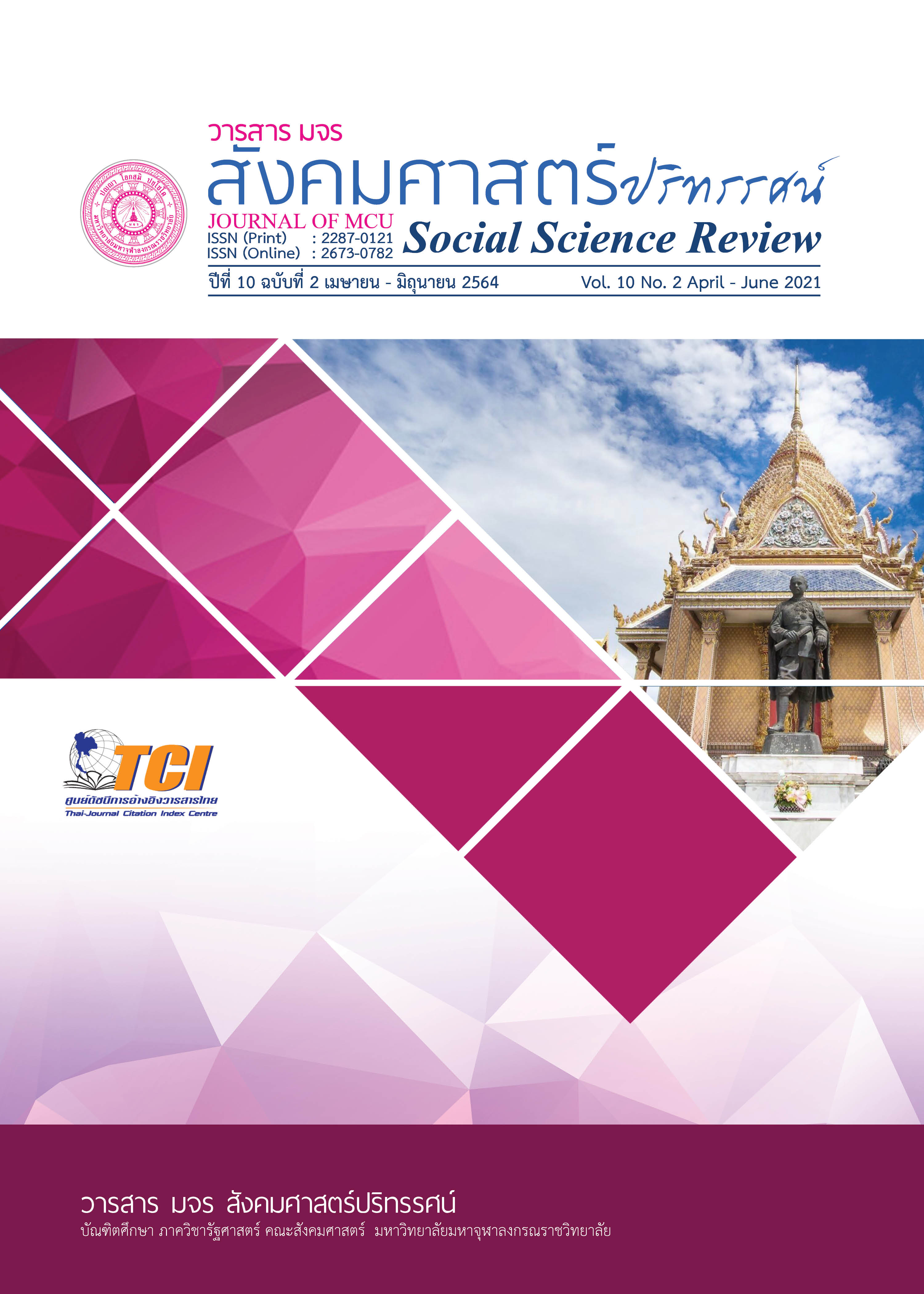รูปแบบการบริหารจัดการด้านการพัฒนาคุณธรรมจริยธรรมในสถานศึกษาของพระสอนศีลธรรมในโรงเรียน จังหวัดเชียงใหม่
คำสำคัญ:
การบริหารจัดการ, การพัฒนาคุณธรรมจริยธรรม, พระสอนศีลธรรมในโรงเรียนบทคัดย่อ
บทความวิจัยนี้มีวัตถุประสงค์เพื่อศึกษาวิเคราะห์สภาพทั่วไป ระดับการบริหารจัดการและนำเสนอรูปแบบ เป็นการวิจัยแบบผสานวิธี ประกอบด้วยการวิจัยเชิงคุณภาพเก็บข้อมูลด้วยการสัมภาษณ์เชิงลึก กับผู้ให้ข้อมูลสำคัญ 18 รูปหรือคน และการสนทนากลุ่มเฉพาะกับผู้ทรงคุณวุฒิ 10 รูปหรือคน วิเคราะห์ข้อมูลเชิงพรรณนา เรียบเรียงและจำแนกอย่างเป็นระบบ และการวิจัยเชิงปริมาณ เป็นการวิจัยเชิงสำรวจ จากแบบสอบถาม ซึ่งมีค่าความเชื่อมั่นทั้งฉบับเท่ากับ 0.964 กับพระสอนศีลธรรมในโรงเรียนจังหวัดเชียงใหม่ จำนวน 177 รูป จาก 385 รูป สถิติที่ใช้ในการวิจัย คือ ค่าความถี่ ค่าร้อยละ ค่าเฉลี่ย ค่าเบี่ยงเบนมาตรฐาน
ผลการวิจัยพบว่า 1) พระสอนศีลธรรมในโรงเรียนให้คำปรึกษา สนทนาธรรม บรรยายธรรม อบรมเยาวชน จัดกิจกรรมทางพระพุทธศาสนา และประเมินผลกลุ่มเป้าหมายร่วมกับสถานศึกษา 2) พระสอนศีลธรรมในโรงเรียนมีความคิดเห็นต่อรูปแบบการบริหารจัดการด้านการพัฒนาคุณธรรมจริยธรรมในสถานศึกษาของพระสอนศีลธรรมในโรงเรียน จังหวัดเชียงใหม่ ในภาพรวมอยู่ในระดับมาก ( = 4.06, S.D. = 0.510) และเมื่อพิจารณาเป็นรายด้านพบว่า อยู่ในระดับมากทุกด้าน 3) รูปแบบการบริหารจัดการมีการวางแผนร่วมกันกับทางสถานศึกษาในการให้คำปรึกษาแก่นักเรียน จัดทำแผนการเรียนการสอน รวมถึงแผนในการพัฒนาคุณธรรมจริยธรรม โดยเน้นการสนทนาธรรมหรือบรรยายธรรมในประเด็นที่น่าสนใจ เทคนิคการอบรมที่สอดคล้องกับพฤติกรรม เป็นต้น
เอกสารอ้างอิง
ไทยรัฐ. (2548, 19 เมษายน). เชียร์พระสอนศีลธรรม. ไทยรัฐ. น. 3.
บุษกร วัฒนบุตร. (2555). การนำพุทธญาณวิทยา (ไตรสิกขา) และตัวแบบ KSM เพื่อสร้างและพัฒนาทุนมนุษย์ในองค์กรมหาชน. (วิทยานิพนธ์ปริญญารัฐประศาสนศาสตรดุษฎีบัณฑิต สาขาวิชารัฐประศาสนศาสตร์). ปทุมธานี: มหาวิทยาลัยราชภัฏวไลยอลงกรณ์ ในพระบรมราชูปถัมภ์.
พระเทพรัตนสุธี (สมศักดิ์ โชตินฺธโร). (2557). กลยุทธ์การปกครองคณะสงฆ์ภาค 1. (วิทยานิพนธ์ปริญญาพุทธศาสตรดุษฎีบัณฑิต สาขาวิชาการจัดการเชิงพุทธ). พระนครศรีอยุธยา: มหาวิทยาลัยมหาจุฬาลงกรณราชวิทยาลัย.
พระมหากฤษฎา กิตฺติโสภโณ (แซ่หลี). (2562). รูปแบบการปลูกฝังคุณธรรมและจริยธรรมสำหรับวัยรุ่นไทยยุคใหม่ตามหลักพุทธธรรม ผ่านกลไกการขับเคลื่อนโครงการคลินิกคุณธรรม ของพระธรรมวิทยากร. วารสาร มจร สังคมศาสตร์ปริทรรศน์, 8(1), 59-70.
วีรชัย อนันต์เธียร. (2556). กลยุทธ์การพัฒนาจริยธรรมสำหรับเยาวชนไทย. (วิทยานิพนธ์ปริญญาพุทธศาสตรดุษฎีบัณฑิต สาขาวิชารัฐประศาสนศาสตร์). พระนครศรีอยุธยา: มหาวิทยาลัยมหาจุฬาลงกรณราชวิทยาลัย.
สำนักงานพระสอนศีลธรรมในโรงเรียน. (2562). สถิติพระสอนศีลธรรมในโรงเรียน. [ออนไลน์]. สืบค้น 12 พฤศจิกายน 2562. จาก https://www.krupra.net/
new/index.php.
สุทธิพงศ์ ตันตยาพิศาลสุทธิ์. (2542). พระบรมราโชวาท. ข้าราชการครู, 20(1), 2 – 11.
อนุพันธ์ อภิชยานุภาพ. (2555). การติดตามประเมินผลโครงการครูพระสอนศีลธรรมในโรงเรียน สังกัดมหาวิทยาลัยมหามกุฏราชวิทยาลัย วิทยาเขตมหาวชิราลงกรณราชวิทยาลัย (รายงานการวิจัย). นครปฐม: มหาวิทยาลัยมหามกุฏราชวิทยาลัย.
ดาวน์โหลด
เผยแพร่แล้ว
รูปแบบการอ้างอิง
ฉบับ
ประเภทบทความ
สัญญาอนุญาต
ลิขสิทธิ์ (c) 2021 วารสาร มจร สังคมศาสตร์ปริทรรศน์

อนุญาตภายใต้เงื่อนไข Creative Commons Attribution-NonCommercial-NoDerivatives 4.0 International License.
เพื่อให้เป็นไปตามกฎหมายลิขสิทธิ์ ผู้นิพนธ์ทุกท่านต้องลงลายมือชื่อในแบบฟอร์มใบมอบลิขสิทธิ์บทความให้แก่วารสารฯ พร้อมกับบทความต้นฉบับที่ได้แก้ไขครั้งสุดท้าย นอกจากนี้ ผู้นิพนธ์ทุกท่านต้องยืนยันว่าบทความต้นฉบับที่ส่งมาตีพิมพ์นั้น ได้ส่งมาตีพิมพ์เฉพาะในวารสาร มจร สังคมศาสตร์ปริทรรศน์ เพียงแห่งเดียวเท่านั้น หากมีการใช้ภาพหรือตารางหรือเนื้อหาอื่นๆ ของผู้นิพนธ์อื่นที่ปรากฏในสิ่งตีพิมพ์อื่นมาแล้ว ผู้นิพนธ์ต้องขออนุญาตเจ้าของลิขสิทธิ์ก่อน พร้อมทั้งแสดงหนังสือที่ได้รับการยินยอมต่อบรรณาธิการ ก่อนที่บทความจะได้รับการตีพิมพ์ หากไม่เป็นไปตามข้อกำหนดเบื้องต้น ทางวารสารจะถอดบทความของท่านออกโดยไม่มีข้อยกเว้นใดๆ ทั้งสิ้น





